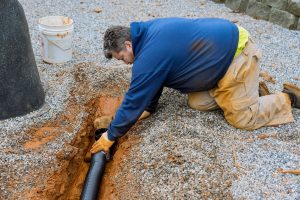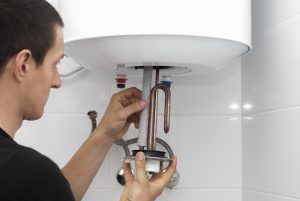Metro Detroit is under severe ice and winter storm warnings this week, which could lead to serious flooding when the weather starts to warm up. Now’s a great time to make sure you’re prepared and guard against flooding in and around your home. Many homes aren’t equipped to handle all of the excess water from heavy rain storms, which can lead to flooding issues. Here are some tips to prevent flooding, and minimize damage in case you do suffer a flood.
1. Stop clogged drains before they start
Heavy rains can cause an upset for your plumbing. It isn’t uncommon that many households are faced with a clogged drain after heavy rain. You may want to have your drains professionally cleaned.
2. Install a plumbing backflow preventer

Backflow, which is the unwanted flow of water in the opposite direction, and can be a serious health risk, often occurs after a heavy rain storm. Dirt and debris can get swept into the sewer system during a heavy rain. It creates a big mess, serious health hazards and it can cause extensive damage, but installing a backflow preventer can prevent untreated sewer water from entering your home. Rooter MD can conduct backflow testing and certification as well as installation, and we’re currently offering $25 off backflow testing and certification. Be sure to check out all our Money-saving Coupons
3. Install a sump pump or inspect your existing sump pump

Sump pumps are designed to prevent flooding during heavy rain. When water enters the crock of the sump pump, it activates and pumps the water out. If you don’t have a sump pump, and live in a flood zone, it would be a good idea to get one, with a battery back-up in case you lose power.. Right now, we’re offering $25 off sump pump installation. If you already have a sump pump, be sure to test it to make sure it works by pouring some water into the crock to make sure it activates.
4. Make sure your storm drains are clean
Storm drains are designed to divert excess water. Over time they can get clogged with leaves, trash, and other debris, which can prevent water from properly draining. Make sure your storm drains are free from clutter so water can drain freely.
5. Clean your gutters and downspouts

Gutters and downspouts serve to divert water away from your home and more importantly, your home’s foundation. Excess water can wreak havoc on your home’s foundation, which can lead to very expensive repairs. Gutters and downspouts can get clogged with leaves and other debris, which can prevent water from flowing. In addition, a damaged gutter or downspout is no good, and can lead to flooding.
Flooding Isn’t Always By Natural Causes
Many people think flooding is just a result of heavy rain or snow melting.
But those aren’t the only causes of flooding, and there are multiple sources inside your home that could cause a flood.
Often, leaking pipes and water heaters, clogged drains and sewer lines, faulty water hoses, and pipes bursting from freezing weather are causes of indoor flooding. Unlike natural causes, these are relatively preventable by simply calling a plumber as soon as you notice a problem.
If You Do Encounter Flooding, Clean Up Should Start Immediately
To minimize the damage done by water, try to remove it as quickly as possible. This may require the use of a pump or simply using towels to dry up whatever is leftover.
Before using anything electrical in your home, consider having a professional to inspect things first to ensure that outlets and wires are safe to use.
After the water has been removed, it’s important to realistically survey the damage. Anything that was submerged in water will likely have damage, this includes floors, drywall, furniture, cabinets, bathtubs, and toilets.
The key is to be aware of possible issues--if you repair the obvious things like floors and drywalls but fail to remove a tub or toilet, mold will grow and spread, and the original work will probably have to be redone.
Drywall is very susceptible to water damage, but to repair it the areas that were wet and a few inches above it need to be removed. This process isn’t the worst but time should be allotted to allow any studs to dry out properly.
Clear The Air

After a flood, your home will be a small construction zone and it will have dust particles and fumes in the air almost constantly.
There is also the added possibility of mold growth. To keep your family breathing easily, consider purchasing or renting an air scrubber. These devices can keep musty smells at bay while minimizing fumes and particles in the air.
Keep in mind that air scrubbers are meant to be a short-term solution. If you are noticing musty odors months after the damage has been repaired, there could be mold growing which means the attention of a professional is required.
If you have questions or want to learn more about protecting your family and your home against flooding,get in touch with us today




